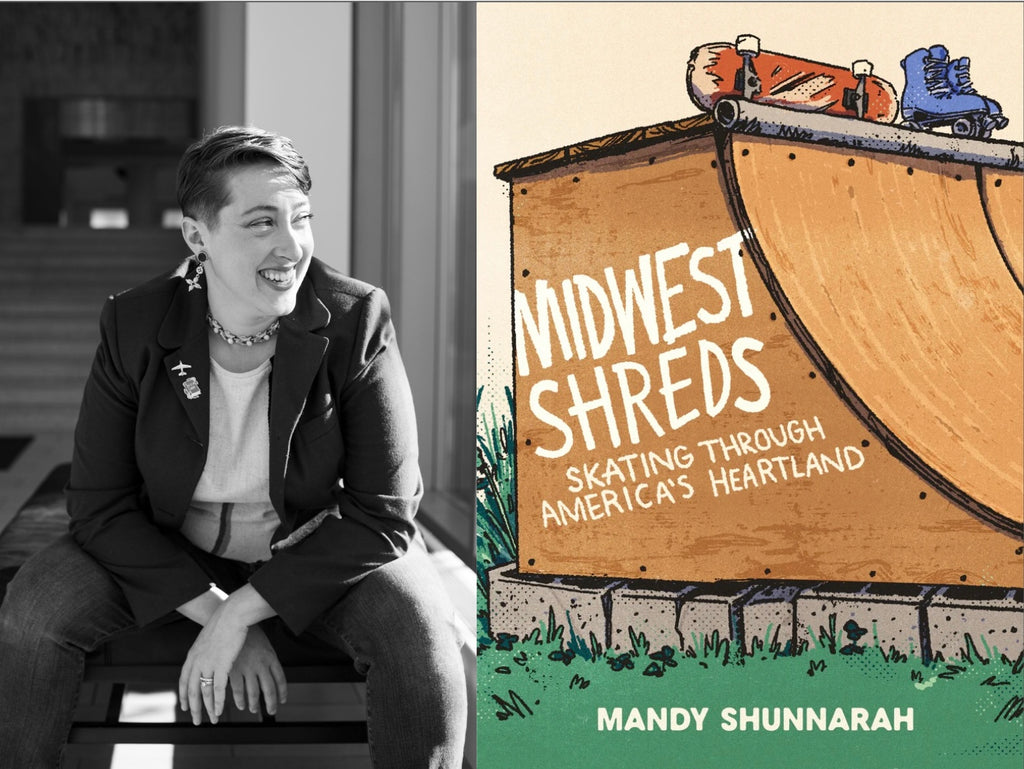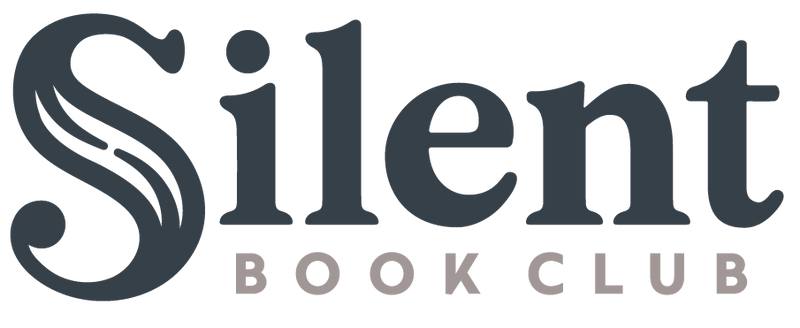Q&A with author and SBC host Mandy Shunnarah

We recently had the pleasure of interviewing Mandy Shunnarah, author, poet, and longtime host of Silent Book Club Columbus. We chatted about her writing journey, publishing her first book, and the joys of being part of the SBC community. Mandy, thank you so much for sharing your time and insights with us!
Preorder a copy of Mandy's new book, Midwest Shreds, on Bookshop.org
Your upcoming book, Midwest Shreds, delves into the skate scene in America's Heartland. What inspired you to explore this topic, and how did your personal experiences with skating shape the narrative?
I grew up in small-town Alabama in the 90s and 2000s, where there were no skateparks or skate shops, so I'd watch TV shows and movies like Viva La Bam, Jackass, and Brink just to see the skating. Whether skateboarding or rollerblading, I didn't care––I wanted to do it all. I saved up my allowance for weeks and finally bought a cheap skateboard from Walmart. When I got tired of doing ollies and kickflips in the driveway, I decided to soar down a massive hill with the reckless abandon that only a 13-year-old with an undeveloped frontal lobe could. I went flying down the hill and off the board and while I was miraculously unharmed, my skateboard made a beeline for the storm drain, never to be seen again. That was when I decided I was better off skating on wheels that were attached to my feet.
For the next handful of years, I was a regular at the local roller rink but stopped going in late high school when I got made fun of. I put my skate dreams on hold until I moved to Columbus, Ohio, and realized there's a little skatepark in so many neighborhoods around the city, and even small towns outside the city. Skate culture is so focused on its West Coast background that I was surprised to see so much skating infrastructure outside the region. And with ample infrastructure, I was finally able to skate at skateparks, albeit in my quad skates, which I'm most comfortable in now.
I've always been a big reader, so whenever I get into a new hobby, I want to read all about it. I scoured bookstores, libraries, and archives, looking for anything about Midwest skate history, and other than a handful of articles online, came up empty. There's a saying among writers that if there's a book you want to read that doesn't exist, you have to write it. I took that advice literally, and Midwest Shreds is the result!
In addition to your prose writing, you're also an award-winning poet. How do your experiences with poetry influence your prose writing, and do you find a connection between the two art forms?
Both art forms are definitely connected for me. I've known I wanted to be a writer since I was 5, so in college, I made it my mission to do any kind of writing that would help me pay my tuition, which is how I landed in journalism. I'm grateful for the years I spent freelancing for newspapers, magazines, weeklies, and online publications because it forced me to learn how to do archival research and interview people effectively––skills I definitely used writing Midwest Shreds.
Midwest Shreds is a hybrid genre work––part cultural history, part travelogue, and part memoir––though if I had to call it one thing, it'd be literary journalism. I later learned there's a similar tradition in poetry called documentary poetry, or docupoetics, that essentially blends journalism and poetry. Once I realized I could do journalism in verse, I became obsessed. I actually just finished the manuscript for my second book, a poetry collection called We Had Mansions, about my Palestinian heritage, family history, love, and nature. I love being able to use my journalistic skills in artistic ways, and I plan to keep writing more literary journalism books and docupoetry collections.
You've been a long-time host of the Columbus, Ohio chapter of Silent Book Club. How did you first get involved with Silent Book Club, and what do you find most rewarding about hosting these gatherings for fellow book lovers?
I moved from Birmingham, Alabama, to Columbus, Ohio, in late 2015. I moved for a man (whom I'm no longer with, but that's a different story), so I had no friends and knew no one besides him and his family. A month or two after I moved, I saw that someone started an SBC chapter in Birmingham and I was so annoyed to be missing out! At first, I was hesitant to try running a regular event in a city where I didn't know anyone, so I waited a couple of months to see if someone else in town would get bitten by the SBC bug.
When I got tired of waiting, I planned our first event in 2016 at a small coffee shop in my neighborhood. So many people showed up that we ran out of chairs! After years of hosting the group, I can now say I know a ton of bibliophiles in the city, and I couldn't be happier to have such a fantastic group of friends. We regularly get 25-40 people per meeting, and it's so rewarding to see all the different books everyone is reading and witness folks bonding over shared interests. Even though I pay attention to the publishing landscape, there are so many excellent books that I would've otherwise missed out on if it weren't for Silent Book Clubbers. Many folks have also become friends outside the group and I'm fortunate to say that myself and one of the longtime members, Michael Hanning, fell in love through SBC and have been together for two years now. SBC has literally changed my life and given me a community I wouldn't have otherwise had.
As a writer, reader, and Silent Book Club host, how do you think the shared experience of reading in silence enhances individual reading experiences and builds community?
What I love about SBC is that you get the community of a book club without the pressure and homework. There was a period when I was in three other book clubs, all with assigned books, on top of reading a lot for work, and I started to lose some of my excitement around reading because it'd begun to feel like a chore. I've cut back a lot, and these days I only run SBC Columbus and a poetry book club at Prologue, one of our local bookstores, which is really nice. I love the dedicated time to reading quietly for an hour because it's like a gentle accountability group. No one judges what you're reading or how many months you bring the same book; we're all just glad to see each other and read in each others' presence. I think the point of joining a book club is to foster a love of reading, and between not having an assigned book, having an eclectic mix of people, and being a chill environment, SBC definitely achieves that goal.
What advice would you give to aspiring writers, particularly those who might be hesitant to share their work or pursue publication? How has being part of the Silent Book Club community influenced your writing journey?
Leading SBC Columbus since 2016 has exposed me to so many different types of books and readers that I truly believe there's a book for everyone. Every time I start to think an idea is too weird to pursue, I remember that someone has read and enjoyed something even weirder just within our group. I find it encouraging because it makes me want to explore some of my odder ideas (particularly in the fiction realm) and connect with readers like the lovely folks I get to hang out with through SBC.
I know every writer says this, but it's true: Putting your writing out there inevitably means rejection. It's an unfortunate reality of the work, but getting used to that has forced me to grow a thicker skin. I know now rejection is seldom, if ever, personal and that it's extremely unlikely editors or the magazines they represent are going to have you on a blacklist just because you sent them something that didn't make their hearts sing once. My strategy is to submit so often that I don't have the time or energy to refresh my email constantly waiting to hear back from any particular magazine. Keep a spreadsheet so you can log where you send what piece and when you sent it, then do your best to forget about it. Focus on the generative part of the process most of all.

